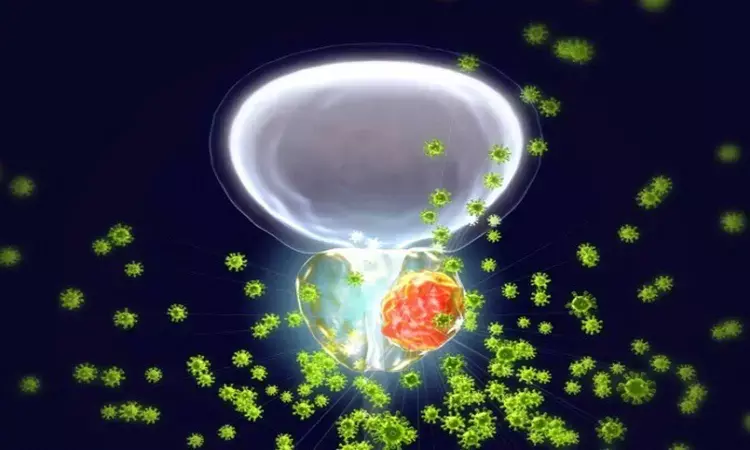- Home
- Medical news & Guidelines
- Anesthesiology
- Cardiology and CTVS
- Critical Care
- Dentistry
- Dermatology
- Diabetes and Endocrinology
- ENT
- Gastroenterology
- Medicine
- Nephrology
- Neurology
- Obstretics-Gynaecology
- Oncology
- Ophthalmology
- Orthopaedics
- Pediatrics-Neonatology
- Psychiatry
- Pulmonology
- Radiology
- Surgery
- Urology
- Laboratory Medicine
- Diet
- Nursing
- Paramedical
- Physiotherapy
- Health news
- Fact Check
- Bone Health Fact Check
- Brain Health Fact Check
- Cancer Related Fact Check
- Child Care Fact Check
- Dental and oral health fact check
- Diabetes and metabolic health fact check
- Diet and Nutrition Fact Check
- Eye and ENT Care Fact Check
- Fitness fact check
- Gut health fact check
- Heart health fact check
- Kidney health fact check
- Medical education fact check
- Men's health fact check
- Respiratory fact check
- Skin and hair care fact check
- Vaccine and Immunization fact check
- Women's health fact check
- AYUSH
- State News
- Andaman and Nicobar Islands
- Andhra Pradesh
- Arunachal Pradesh
- Assam
- Bihar
- Chandigarh
- Chattisgarh
- Dadra and Nagar Haveli
- Daman and Diu
- Delhi
- Goa
- Gujarat
- Haryana
- Himachal Pradesh
- Jammu & Kashmir
- Jharkhand
- Karnataka
- Kerala
- Ladakh
- Lakshadweep
- Madhya Pradesh
- Maharashtra
- Manipur
- Meghalaya
- Mizoram
- Nagaland
- Odisha
- Puducherry
- Punjab
- Rajasthan
- Sikkim
- Tamil Nadu
- Telangana
- Tripura
- Uttar Pradesh
- Uttrakhand
- West Bengal
- Medical Education
- Industry
Immunotherapy offers hope for advanced prostate cancer

An antibody for treating advanced prostate cancer improves progression-free survival in patients with metastasised, castration-resistant prostate cancer. This is the finding of the long-term analyses of an international phase 3 clinical trial, recently published in the leading journal European Urology. The study showed that overall survival was 2 - 3 times higher than in the placebo arm.
Ipilimumab is a humanised monoclonal IgG1 antibody that is active against CTLA-4. CTLA-4 is a molecule that controls part of the immune system by down-regulating it. "Cancer cells can evade the endogenous defence of the immune system by deactivating it. An antibody that targets CTLA-4, a so-called checkpoint inhibitor (CPI), can block this deactivation, thereby reactivating the immune system once again. This reactivated immune response can then help the body to destroy cancer cells," explains oncologist Michael Krainer from the Department of Medicine I at MedUni Vienna/Vienna General Hospital and from the Comprehensive Cancer Center (CCC). The internationally renowned "Urological Tumours" working group from the division led by Krainer was invited to participate in the first global clinical phase 3 trial of a CPI in prostate cancer CA184-043, the long-term results of which have now been published in European Urology, the world's most influential urology journal.
The recent trial included a total of 799 men. It was conducted globally: in the USA, Canada, South America, Australia and European countries. Patients were randomised in a 1:1 ratio to receive bone metastasis radiotherapy (a single 8 Gy fraction) followed by either ipilimumab 10 mg/kg or a placebo every three weeks via up to four injections. Although in the first planned analysis, the survival advantage in the treated group was present it was not significant, whereas the recent analysis shows that long-term survival after 3, 4 and 5 years is two - three times higher in the immunotherapy arm as opposed to the placebo arm.
Ipilimumab is already licensed by the European Medicines Agency to treat melanoma, lung cancer and bladder cancer. However, there is still a lack of reliable data for approval to treat prostate cancer, since the first planned analysis did not show any significant survival advantage. In the light of the new long-term results, Krainer says: "Immunotherapy is highly promising and can be used, for example, when chemotherapy options have been exhausted or are undesirable. It can also be expedient to start it at an early stage, since any treatment is more effective if there is little cancer present and the patient is in good general health. We are the first group in Austria to gain such valuable experience and we are now attempting to incorporate immunotherapy into the treatment in the context of international clinical trials."
The working group will soon start on two study protocols using immunotherapy before a chemotherapy that is currently the standard treatment for patients with castration-resistant prostate cancer.
https://www.sciencedirect.com/science/article/abs/pii/S0302283820306047?via=ihub
Hina Zahid Joined Medical Dialogue in 2017 with a passion to work as a Reporter. She coordinates with various national and international journals and association and covers all the stories related to Medical guidelines, Medical Journals, rare medical surgeries as well as all the updates in the medical field. Email: editorial@medicaldialogues.in. Contact no. 011-43720751
Dr Kamal Kant Kohli-MBBS, DTCD- a chest specialist with more than 30 years of practice and a flair for writing clinical articles, Dr Kamal Kant Kohli joined Medical Dialogues as a Chief Editor of Medical News. Besides writing articles, as an editor, he proofreads and verifies all the medical content published on Medical Dialogues including those coming from journals, studies,medical conferences,guidelines etc. Email: drkohli@medicaldialogues.in. Contact no. 011-43720751


